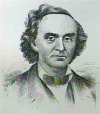Price-Harney Agreement
 |
 |

Many Missourians were outraged by the Camp Jackson Affair and went from being neutral to publicly in favor of secession. This was exactly the kind of “military coercion” against which the delegates at the Missouri State Convention had spoken. On May 11, 1861 in direct response to the Camp Jackson Affair, the Missouri State Legislature passed “An act to raise money to arm the State, repel invasion, and protect the lives and property of the people of Missouri” which authorized Missouri Governor Claiborne Fox Jackson to reorganize the state militia into the Missouri State Guard. On May 15, 1861, the Missouri State Legislature passed “An act to authorize the appointment of one Major General for the Missouri Militia.” Governor Jackson appointed Sterling Price to be Major-General of the Missouri State Guard. Later, in July of 1861, a new session of the Missouri State Convention would vote to repeal these acts. In an attempt to restore calm to Missouri, the Secretary of War reinstated Brigadier-General Harney as commander of the Department of the West. Harney issued a proclamation, part of which stated “The military force stationed in this department by authority of the Government and now under my command will only be used in the last resort to preserve the peace. I trust I may be spared the necessity of resorting to martial law, but the public peace must be preserved and the lives and property of the people protected.” [17]
Missouri Governor Jackson decided to send Major-General Sterling Price to begin discussions with Brigadier-General William Harney. Jackson was concerned by Harney's proclamation and feared continued intervention in Missouri by Federal troops. As a result of their talks, Price and Harney worked out an agreement on May 21st. Harney agreed that Federal troops would not intervene militarily in Missouri, as long as Price maintained order throughout the state. Harney asked Price to disband the Missouri State Guard, but Price declined, saying he did not have the authority to do this. But Price did issue an order for the Missouri State Guard to return to their home districts.[18]

Although favored by moderates in the state, the Price-Harney Agreement was an anathema to Secessionists and Unconditional Unionists alike. Frank P. Blair had been instrumental in getting Harney removed from command back in April and viewed the agreement with “great disgust.” Even President Lincoln believed that the “professions of loyalty to the Union by the State authorities of Missouri are not to be relied upon.” Frank Blair had an ace in the hole, he had a copy of Special Order No. 135, dated May 16th, which relieved Harney from command. But Blair had received a message from President Lincoln, dated May 18th, asking Blair to “withhold [the order], unless in your judgment the necessity to the contrary is very urgent.” Lincoln was asking his friend Blair to relieve Harney from command only if he thought the future of Missouri staying in the Union depended on it. Blair decided the Price-Harney Agreement was too much and delivered the order to Harney on May 30th. On May 31st, Nathaniel Lyon assumed command of the Department of the West, having been promoted to Brigadier-General of Volunteers effective on May 18th. [19]
Frank Blair sent a letter to Lincoln, explaining his decision to deliver the order to Harney: [20]
“We have conclusive evidence that extensive preparations within this State are on foot to raise and arm large forces to make war upon the United States Government. From every neighborhood in the central and southwest portion of the State men are drilling and arming, and both arms and men will speedily be brought to the State from Arkansas. A large number of wagons have been sent from Jefferson City to the southern part of the State to transport arms and other munitions of war. For the last ten days I have had most of my time occupied by persons from all parts of the State, who have come here expressly to give information of this state of facts, and ask the aid of the Government to protect Union men. Should these things be permitted longer to go on, the Union men would be crushed or driven out from all parts of the State, and the State be completely given over to the hands of the rebels.”
Back: Camp Jackson
Next: Missouri Goes To War
